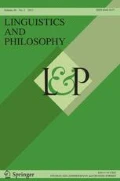Abstract
Why do we ask questions? Because we want tohave some information. But why this particular kind ofinformation? Because only information of this particularkind is helpful to resolve the decision problemthat the agent faces. In this paper I argue thatquestions are asked because their answers help toresolve the questioner's decision problem, and that thisassumption helps us to interpret interrogativesentences. Interrogative sentences are claimed to have asemantically underspecified meaning and thisunderspecification is resolved by means of the decisionproblem.
Similar content being viewed by others
REFERENCES
Aloni, M.: 2001, Quantification under Conceptual Covers, Ph.D. thesis, ILLC, University of Amsterdam.
Asher, N. and A. Lascarides: 1998, ‘Questions in Dialogues’ , Linguistics and Philosophy 21, 237–309.
Atlas, J. and S. Levinson: 1981, ‘It-Clefts, Informativeness and Logical Form’ , in P. Cole (ed.), Radical Pragmatics, Academic Press, New York.
Bar-Hillel, Y. and R. Carnap: 1953, ‘Semantic Information’ , Proceedings of the Symposium on Applications of Communication Theory, Butterworth Scientific Publications, London.
Beck, S. and H. Rullmann: 1999, ‘A Flexible Approach to Exhaustivity in Questions’ , Natural Language Semantics 7, 249–298.
Blackwell, D.: 1953, ‘Equivalent Comparisons of Experiments’ , Annals of Mathematical Statistics 24, 265–272.
Boër, S. E. and W. G. Lycan: 1975, ‘Knowing Who’ , Philosophical Studies 28, 299–344.
Gerbrandy, J.: 1997, ‘Questions of Identity’ , in P. Dekker et al. (eds.), The Proceedings of the 11th Amsterdam Colloquium, Amsterdam.
Ginzburg, J.: 1995, ‘Resolving Questions, I’ , Linguistics and Philosophy 18, 459–527.
Ginzburg, J. and I. Sag: 2000, Interrogative Investigations. The Form, Meaning, and Use of English Interrogatives, CSLI Publications, Stanford.
Grewendorf, G.: 1981, ‘Answering as Decision Making: A New Way of Doing Pragmatics’ , in H. Parret et al. (eds.), SLCI, vol 7, Possibilities and Limitations of Pragmatics, John Benjamin, Amsterdam, pp. 263–284.
Groenendijk, J.: 1999, ‘The Logic of Interrogation’ , in T. Matthews & D. L. Strolowitch (eds.), Proceedings SALT 9, CLC Publications, Stanford.
Groenendijk, J. and M. Stokhof: 1982, ‘Semantic Analysis of wh-complements’ , Linguistics and Philosophy 5, 175–233.
Groenendijk, J. and M. Stokhof: 1984, Studies on the Semantics of Questions and the Pragmatics of Answers, Ph.D. thesis, University of Amsterdam.
Hamblin, C. L.: 1973, ‘Questions in Montague English’ , Foundations of Language 10, 41–53.
Hausser, R. and D. Zaefferer: 1979, ‘Questions and Answers in a Context-dependent Montague Grammar’ , in F. Guenthner & S. Schmidt (eds.), Formal Semantics and Pragmatics for Natural Languages, Reidel, Dordrecht, pp. 339–358.
Heim, I.: 1994, ‘Interrogative Semantics and Karttunen's Semantics for know’ , in R. Buchalla & A. Mittwoch (eds.), IATL 1, Akademon, Jerusalem, pp. 128–144.
Higginbotham, J. and R. May: 1981, ‘Questions, Quantifiers, and Crossing’ , Linguistic Review 1, 41–79.
Hintikka, J.: 1976, ‘The Semantics of Questions and the Questions of Semantics’ , Acta Philosophica Fennica 28.
Hintikka, J.: 1978, ‘Answers to Questions’ , in H. Hiz (ed.), Questions, D. Reidel, Dordrecht, pp. 347–1300.
Hirschberg, J.: 1985, A Theory of Scalar Implicatures, Ph.D. thesis, UPenn.
Karttunen, L.: 1977, ‘Syntax and Semantics of Questions’ , Linguistics and Philosophy 1, 3–44.
Krifka, M.: 1999, ‘For a Structured Account of Questions and Answers’ , in C. Smith (ed.), Proceedings to Workshop on Spoken and Written Text, University of Texas at Austin.
Lewis, D.: 1988, ‘Relevant Implication’ , Theoria 54, 161–174.
Marschak, J.: 1974, ‘Information, Decision, and the Scientist’ in C. Cherry (ed.), Pragmatic Aspects of Human Communication, Reidel, Dordrecht, pp. 145–178.
Merin, A.: 1999, ‘Information, Relevance, and Social Decisionmaking: Some Principles and Results of Decision-Theoretic Semantics’ , in L. Moss, J. Ginzburg and M. de Rijke (eds.), Logic, Language, and Computation. Vol. 2, CSLI, Stanford.
Parikh, P.: 1992, ‘A Game-theoretical Account of Implicature’ , in Y. Vardi (ed.), Theoretical Aspects of Rationality and Knowledge: TARK IV, Monterey, California.
Parikh, P.: 2001, The Use of Language, CSLI Publications, Stanford, California.
Parikh, R.: 1994, ‘Vagueness and Utility: The Semantics of Common Nouns’ , Linguistics and Philosophy 17, 521–535.
Perry, J.: 1977, ‘Frege on Demonstratives’ , Philosophical Review 86, 474–497.
Raiffa, H. and R. Schlaifer: 1961, Applied Statistical Decision Theory, MIT Press, Cambridge, MA.
Ramsey, F. P.: 1990, ‘Weight or the Value of Knowledge’ , British Journal for the Philosophy of Science, 41, 1–4.
Rooy, R. van: 1999, ‘Questioning to Resolve Decision Problems’ , in P. Dekker (ed.), Proceedings of the Twelfth Amsterdam Colloquium, ILLC, Amsterdam.
Rooy, R. van: 2001, ‘Relevance of Communicative Acts’ , in J. van Benthem (ed.), Theoretical Aspects of Rationality and Knowledge: TARK VIII, Morgan Kaufmann, San Francisco, pp. 83–96.
Rooy, R. van: 2002, ‘Utility, Informativity, and Protocols’ , in Bonanno et al (eds.), Proceedings of LOFT 5: Logic and the Foundations of the Theory of Games and Decisions, Torino.
Rooy, R. van: to appear, ‘Utility of Mention-some Questions’ , Journal of Language and Computation.
Rozenkrantz, R.: 1970, ‘Experimentation as Communication with Nature’ , in J. Hintikka & P. Suppes (eds.), Information and Inference, Reidel, Dordrecht, pp. 58–93.
Rullmann, H.: 1995, Maximality in the Semantics of WH-Constructions, Ph.D. thesis, Amherst.
Savage, L. J.: 1954, The Foundations of Statistics, New York: Wiley.
Schulz, K.: 2002, Relevanz und ‘Quantity’ Implikaturen, Diplomarbeit, University of Stuttgart.
Shannon, C.: 1948, ‘The Mathematical Theory of Communication’ , Bell System Technical Journal 27, 379–423 and 623–656.
Stechow, A. von: 1984, ‘Comparing Semantic Theories of Comparison’ , Journal of Semantics 3, 1–77.
Westerståhl, D.: 1984, ‘Determiners and Context Sets’ , in J. van Benthem and A. ter Meulen (eds.), Generalized Quantifiers in Natural Language, Foris, Dordrecht, pp. 45–71.
Author information
Authors and Affiliations
Rights and permissions
About this article
Cite this article
van Rooy, R. Questioning to Resolve Decision Problems. Linguistics and Philosophy 26, 727–763 (2003). https://doi.org/10.1023/B:LING.0000004548.98658.8f
Issue Date:
DOI: https://doi.org/10.1023/B:LING.0000004548.98658.8f




